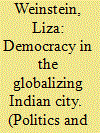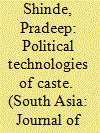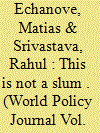| Srl | Item |
| 1 |
ID:
090906


|
|
|
|
|
| Publication |
2009.
|
| Summary/Abstract |
Transformations under way in Indian cities have begun to alter the opportunities for democratic participation among the urban poor. Highlighting efforts to promote globally oriented urban developments in Mumbai, this article examines the state's engagement with groups directly impacted by these efforts. Based on ethnographic research and interviews with key stakeholders in the Dharavi Redevelopment Project (DRP), the article traces the character of such engagements over the project's four-year planning process. It finds that the state undertook an unusually inclusive process, consulting with resident and activist groups at points throughout this period. The article posits that this novel engagement is an unintended consequence of pressures to promote rapid development and ease investor concerns. Situating this case in the recent literature on political shifts in the globalizing Indian city, it concludes that the state may be engaging more with the urban poor than many of these accounts suggest.
|
|
|
|
|
|
|
|
|
|
|
|
|
|
|
|
| 2 |
ID:
144361


|
|
|
|
|
| Summary/Abstract |
This paper describes the political technologies of a caste certificate regularly employed by a Denotified Tribe, the Kunchikorves, in the Mumbai slum of Dharavi. The author demonstrates how the Kunchikorves mobilise kin and affine relations and engage with different organs of the state in an effort to authenticate their caste status. These ‘caste certificates’ are needed to make use of reservations policies to get government jobs and higher education. Municipal jobs and promotions are desirable as the basis for secure employment and upward mobility. Describing the circuitous methods by which the Kunchikorves obtain such authenticating documents, this paper notes that caste identity, while not hinging on notions of purity or pollution, is still an important vehicle for collective identification in contemporary India. The post-colonial state can be said to have extended and elaborated the colonial state's enumerating and objectifying imperatives when it comes to group identity. Groups such as the Kunchikorves are complicit in these objectifying measures, and actively seek out authenticating proofs of an identity that was originally pejorative, arbitrary and imposed. This paper argues that the Kunchikorves’ manufacturing of caste certificates secures them a job, while at the same time bequeathing them a caste categorisation necessarily mediated by processes of bureaucratic authentication.
|
|
|
|
|
|
|
|
|
|
|
|
|
|
|
|
| 3 |
ID:
145610


|
|
|
|
|
| Summary/Abstract |
Eight years ago, architects Matias Echanove and Rahul Srivastava set up their offices in Dharavi, a homegrown neighborhood in Mumbai. Instead of denigrating Dharavi as a “slum,” Echanove and Srivastava celebrate its vitality and adaptability. They point to the lessons that other cities can learn from Dharavi and demonstrate how “family and community networks can be the foundations” of an urban area.
|
|
|
|
|
|
|
|
|
|
|
|
|
|
|
|